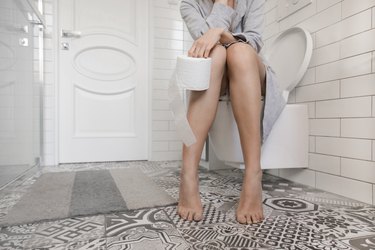
Some say the eyes are a window to the soul. And while this romantic notion is up for debate, your poop is definitely a window to your health.
Your bowel movements are closely related to the foods you eat — or don't eat. Which is why the keto diet can disrupt your usual restroom routine. Read on for three ways keto can change your poop and what that means for your health.
Video of the Day
Video of the Day
Read more: 7 Signs Your Gut Is Out of Whack
1. Keto Constipation
If you're someone that has lived most of your life enjoying a variety of fruits and whole grains, you probably also enjoyed the luxury (yes, it's a luxury) of regular digestion. But once you banish these carbs from your diet, your fiber intake takes a big hit, too, according to Niket Sonpal, MD, a New York-based internist and gastroenterologist.
Fiber is the nutrient responsible for keeping your poops consistent, and in order to maintain regularity, you should aim to eat about 25 grams of fiber per day, according to the FDA. But when you cut carbs, you also cut a lot of key fiber sources, like whole grains, fruits and legumes.
So, if you adopt a low-carb, high-fat/protein diet, don't be surprised if you see a reduced number of bowel movements each week, Dr. Sonpal says. You can combat these effects by eating more high-fiber low-carb foods, like avocados (about 10 grams of fiber per cup) or raspberries (about 8 grams per cup).
When to worry: If you fall below three bowel movements per week, you'll want to consult your doctor, advises Dr. Sonpal. Especially if your movements were more frequent before you began the diet.

2. Keto Diarrhea
On the complete opposite end of the spectrum, some people might experience bouts of diarrhea after starting a low-carb, high-fat diet, Dr. Sonpal says. "This happens when the body doesn't digest all the fat that it is consuming, leading to an upset stomach," he explains.
Chronic diarrhea may also be a sign of steatorrhea, which is when you have too much fat in your stool, according to the International Foundation for Gastrointestinal Disorders. Statorrhea is a sign of malabsorption, which happens when your body doesn't break down or absorb the foods and nutrients you consume. Over time, this can lead to nutrient deficiency or dehydration.
Steatorrhea can be caused by a variety of factors, according to an October 2019 study published in StatPearls. But if you only began experiencing symptoms after dramatically shifting your diet, it's probably the reason you're experiencing diarrhea.
When to worry: Typically, keto diarrhea is temporary and can be avoided by introducing the diet slowly. But if these symptoms persist longer than a few days, it's probably best to consult your doctor and revert back to your usual eating habits.
3. Keto and Yellow (or Smelly) Poop
Yellow or particularly smelly poop is another side effect you may experience after taking on a low-carb, high-fat, high-protein diet. As with symptoms of diarrhea, your stool can become yellow in color or foul in odor due to excess fat, according to the Mayo Clinic.
While yellow or foul-smelling poop isn't dangerous per se, it does indicate that your intestines aren't absorbing enough nutrients or your liver isn't producing enough bile to break down the fat in your diet, according to the University of Rochester Medical Center.
When to worry: If your poop doesn't return to a normal color after a few days, it's probably best to consult your doctor.
Read more: 5 Possible Risks of a Keto Diet
What Does This Mean for Your Diet?
While the keto diet can help you lose weight, it may not be the best diet for your body if you're experiencing problematic digestion. "It may be helpful in losing stubborn weight, but it may be dangerous if you have a chronic condition like IBS," Dr. Sonpal says.
If you experience digestive issues on keto, consult your doctor, who can suggest other weight-loss plans that might be healthier for you.